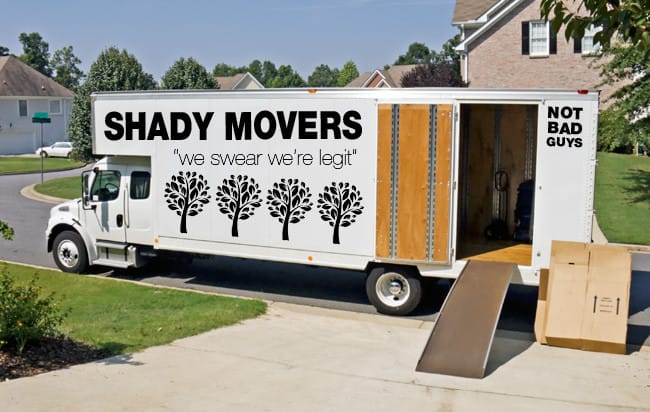10 Moving Company Scams to Avoid: Protect Your Move
Thousands of complaints about moving company scams are reported yearly, with victims losing an average of $5,000 to $10,000.


Thousands of complaints about moving company scams are reported each year, with victims losing an average of $5,000 to $10,000. These numbers aren't just statistics – they represent families who trusted movers with their life's possessions, only to face devastating losses.
Moving fraud has become increasingly sophisticated in our digital age, making distinguishing legitimate moving companies from scammers harder. We've created this comprehensive guide to help you identify and avoid common moving scams. We'll walk you through essential verification steps, red flags to watch for, and precisely what to do if caught in a moving company scheme.
In this article, you'll learn:
- How to spot and avoid the most common moving company scams
- Step-by-step verification process for choosing legitimate movers
- Warning signs during the estimate and booking process
- What to include in your moving contract for protection
- Actions to take if you become a victim of moving fraud
Common Moving Company Scams in the Digital Age
In today's digital landscape, moving scams have evolved significantly, with the Better Business Bureau reporting over 1.5 million inquiries about moving companies in 2023. Let's explore the most common digital-age moving scams we're seeing and how to protect ourselves.
Fake reviews and website fraud
Identifying legitimate moving companies has become increasingly challenging due to sophisticated review manipulation. We've observed that fake reviews often share these telling characteristics:
- Sudden surges of positive reviews in a short timeframe
- Overly enthusiastic language without specific details
- Reviews from accounts with minimal history
What's particularly concerning is that these fraudulent companies frequently change their names to avoid detection and maintain a clean online presence. We've found that legitimate reviews typically include both positive and negative aspects of the service, providing specific details about the moving experience.
Social media advertising schemes
Social media platforms have become a breeding ground for moving scams, with fraudulent companies using targeted advertising to lure unsuspecting customers. The Federal Trade Commission warns that these scammers often use high-pressure sales tactics, pushing customers to "act quickly" for special deals. We're seeing a projected 35% increase in moving scams since last year, with many originating from deceptive social media advertising.
These digital scammers typically operate by offering dramatically lower prices than legitimate competitors. When we investigate these cases, we often find that these companies either disappear with the deposit or dramatically increase prices after loading your belongings. To protect yourself, we strongly recommend verifying any moving company's credentials through the U.S. Department of Transportation's website, regardless of how convincing their social media presence may appear.
Essential Pre-Booking Verification Steps
Proper verification is your strongest defense against moving scams. Let's walk through the essential steps we recommend for protecting yourself before signing any moving contract.
How to verify company credentials
We always start our verification process by checking the mover's Department of Transportation (DOT) number. Every legitimate interstate moving company must be registered with the Federal Motor Carrier Safety Administration (FMCSA) and have a valid DOT number. Here are the key verification steps we recommend:
- Request the company's DOT number and MC (Motor Carrier) number
- Verify registration status on the FMCSA website
- Check if the company name and address match their documentation
- Confirm they have an actual business location (not just a P.O. box)
- Visit their physical location when possible
Understanding insurance and licensing requirements
We've learned that legitimate movers must offer two distinct types of liability coverage:
- Full Value Protection: Makes the mover liable for the replacement value of lost or damaged items
- Released Value Protection: Provides basic coverage at no additional cost (60 cents per pound per article)
Understanding that a mover's business liability insurance differs from your goods' coverage is crucial. We recommend reviewing your homeowner's policy before purchasing additional insurance, as you might already have some coverage.
Tools for background checks and complaint history
In our experience, thorough background checks are essential. We use several reliable tools to investigate moving companies:
The FMCSA's National Consumer Complaint Database is our primary resource for checking complaint history. We also verify through the Better Business Bureau (BBB) for additional complaints and ratings. When reviewing complaints, we pay special attention to patterns involving:
- Price increases after loading
- Delayed deliveries
- Missing or damaged items
- Hostage load situations
Remember, we've found that having no complaints can sometimes be as suspicious as having many – legitimate companies typically have at least a few resolved complaints due to the nature of the business.
Red Flags During the Estimate Process
One of the most critical moments in our fight against moving scams comes during the estimate process. Through years of investigating fraudulent movers, we've identified several telltale signs that can save you from becoming a victim.
Analyzing quote authenticity
We've found that legitimate estimates require an in-person or virtual survey of your belongings. When a company offers a quote over the phone without seeing your items, we consider this a major red flag. In our experience, any estimate that seems unusually low compared to other quotes deserves extra scrutiny. We've seen cases where movers offer non-binding estimates that can change dramatically on moving day.
Hidden fees and contract traps
We regularly encounter these common hidden charges that scammers try to slip into contracts:
- Long carry fees for parking restrictions
- Stair and elevator fees (illegal for moves under 100 miles)
- Packing material costs not mentioned upfront
- Environmental and disposal fees
- Assembly/disassembly charges
Never sign incomplete or blank documents - this is a tactic we've seen scammers use to add charges later. We always insist on reviewing a complete, written contract that includes all potential fees and services.
Weight-based pricing manipulation
We've uncovered several weight-based scams that you should watch for. Some dishonest movers manipulate weight tickets by:
- Weighing trucks with full gas tanks and entire crews inside
- Adding items from other jobs to increase weight
- Using different scales for empty and loaded weights
To protect yourself, we recommend requesting a "binding not-to-exceed" estimate, which means you won't pay more than the quoted price even if your shipment weighs more than estimated. We've found that legitimate companies charge based on actual weight, not cubic feet, as weight can be independently verified.
When reviewing estimates, we always look for detailed breakdowns of costs and services. If a company uses vague terms or refuses to provide specific pricing information, we consider this a serious warning sign. In our investigations, we've found that reputable movers will always provide clear, itemized quotes that outline every potential charge.
Remember, if a company demands a large deposit upfront or insists on cash payment, these are classic signs of a potential scam. We've learned that legitimate movers typically only require payment upon delivery of your belongings.
Creating a Legally Sound Moving Contract
A legally binding moving contract serves as your strongest protection against moving fraud. We've helped countless families navigate the complexities of moving agreements, and we're sharing our expertise to ensure your contract provides maximum protection.
Required contract elements
We always insist that your moving contract (bill of lading) includes these essential components:
- Company's legal name, USDOT number, and physical address
- Detailed pickup and delivery dates or time windows
- Complete cost breakdown and payment terms
- Valuation coverage options and insurance details
- Inventory list of all items being moved
- Signatures from both parties on all pages
Never sign a contract with blank pages or incomplete sections - this is a critical rule we've learned from investigating numerous moving scams.
Documentation and inventory requirements
The inventory documentation process is particularly crucial. We require our clients to follow these essential steps:
- Ensure the mover prepares a detailed inventory before loading
- Review each item's condition noted on the inventory
- Document any existing damage or unusual wear
- Sign each inventory page and get the driver's signature
- Keep a copy of the complete inventory
We've found that your ability to dispute lost or damaged items often depends on these initial inventory notations. The mover must attach the complete inventory to your Bill of Lading.
Payment terms and protection clauses
Through our experience with moving fraud cases, we've identified several critical payment protections that should be in your contract. For interstate moves, you're only required to pay the estimated cost plus 10% at delivery. The remaining balance is due within 30 days.
We strongly recommend getting a binding estimate, which can only be increased if you agree to additional services. While companies may charge a fee for binding estimates, we've found they often save money in the long run by preventing unexpected cost increases.
For protection against service issues, your contract should clearly state:
- The exact payment methods accepted
- When payments are due
- Your rights if delivery dates aren't met
- Storage fees and conditions (if applicable)
- Claims process for damaged or lost items
We've learned that reputable movers will provide clear, written documentation of all these terms. If a company resists including any of these elements in writing, we consider it a serious warning sign of potential moving fraud.
Steps for Immediate Action If Scammed
If you've fallen victim to a moving scam, immediate action is crucial for protecting your rights and recovering your property. Our experience handling thousands of moving fraud cases has taught us the most effective steps to take.
Legal reporting procedures
When dealing with moving fraud, we recommend following these specific reporting steps:
- Contact FMCSA's National Consumer Complaint Database (1-888-368-7238)
- File a report with the DOT Inspector General's Fraud Hotline (1-800-424-9071)
- Submit a complaint to your state's attorney general office
- Report to local law enforcement, primarily if your belongings are being held hostage
- File a complaint with the Better Business Bureau
Documentation requirements
We've found that proper documentation significantly increases your chances of recovery. Gather these essential items immediately:
- All emails, contracts, and receipts related to the move
- Photos of damaged items and discrepancies
- Records of all communication attempts with the company
- Bank statements and payment confirmations
- Copies of estimates and inventory lists
Recovery and compensation options
In our experience handling moving fraud cases, several recovery paths are available. First, attempt direct resolution with the company - sometimes, what appears to be fraud might be a misunderstanding that can be cleared through proper communication.
If direct communication fails, we recommend these recovery options:
Credit Card Disputes: If you paid by credit card, contact your bank immediately to dispute the charges. We've seen many successful charge reversals when properly documented.
Legal Action Options:
- Small claims court for amounts within your state's limits
- Class action lawsuits if multiple victims are involved
- Professional legal consultation for significant losses
Government Assistance: The FMCSA works directly with consumers to help recover money and goods. We've observed that criminal misconduct cases may be referred to the U.S. Department of Justice for investigation.
Compensation programs may be available for victims of specific types of fraud. Some states offer up to $2,000 for moving expenses plus three months of rent (not exceeding $1,800). However, we always emphasize that these programs typically require you to exhaust other payment sources first.
Important: We strongly recommend maintaining a detailed chronological record of all actions taken after discovering the fraud. This documentation becomes crucial if legal action becomes necessary. In our experience, the more thoroughly you document your case, the better your chances of receiving compensation.
Stay Vigilant
Moving scams have become more sophisticated, but we've armed you with the knowledge to protect yourself and your belongings. Proper verification, careful contract review, and awareness of common scams can significantly reduce your risk of becoming a victim.
Remember these key protective measures:
- Check company credentials through FMCSA
- Get detailed, binding estimates in writing
- Document everything, from inventory to communication
- Never sign incomplete contracts
- Keep copies of all paperwork
Should you encounter problems, quick action makes a big difference. Report issues immediately to authorities and gather evidence to support your case.
Are you ready for your easiest move ever? With Drifted.Ai, you can say goodbye to hidden fees, surprise charges, and moving-day stress. We offer transparent pricing, reliable movers, and a truly stress-free experience, so you know exactly what to expect every step of the way. Let us handle the heavy lifting while you focus on settling into your new home. Click below to get your free, no-obligation quote today. Your easiest move is just a click away!
Smart preparation and choosing trustworthy movers will help ensure your move goes smoothly. While scams exist, legitimate moving companies still outnumber fraudulent ones. Use our guide as your checklist, stay vigilant, and make informed decisions to protect your valuable possessions during your next move.
FAQs
Q1. What are some red flags to watch out for when getting a moving estimate? Be wary of unusually low quotes, estimates given without seeing your belongings, demands for large upfront deposits, and vague or incomplete contracts. Legitimate movers provide detailed, itemized quotes and don't pressure you to make quick decisions.
Q2. What should be included in a proper moving contract? A legally sound moving contract should include the company's legal name and DOT number, detailed pickup and delivery dates, a complete cost breakdown, valuation coverage options, and a comprehensive inventory list. Ensure all pages are signed by both parties and never sign blank or incomplete documents.
Q3. Is it normal for movers to only accept cash payments? No, this is often a sign of a potential scam. Reputable moving companies typically accept multiple forms of payment, including credit cards. If a mover insists on cash-only transactions, it's a red flag as it leaves no paper trail and makes disputing charges difficult.
Q4. What should I do if I suspect I've been scammed by a moving company? Act quickly by reporting the incident to the FMCSA's National Consumer Complaint Database and your state's attorney general office. Gather all relevant documentation, including contracts, receipts, and communication records. If you paid by credit card, contact your bank to dispute the charges. Consider legal action or seeking assistance from government programs for compensation.

